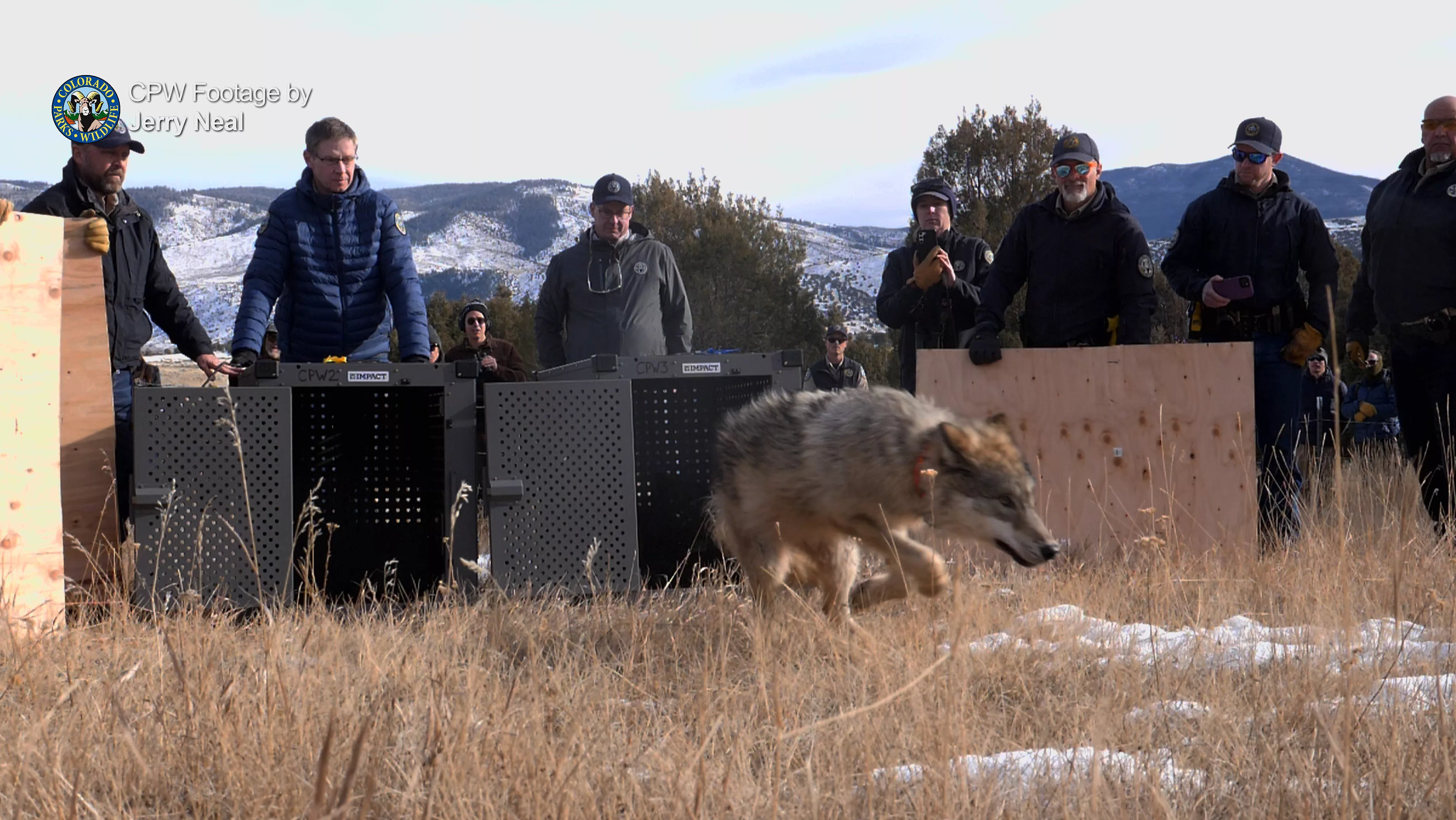
By Shannon Lukens.
The Colorado Parks and Wildlife Commission met in Denver this week and there was much discussion and updates on wolves. We also sent a list of questions to CPW Public Information Supervisor Travis Duncan this week and heard back today.
The first question was if we can be told where the wolves are or where they have been. Duncan confirmed wolves have been tracked in South Routt County but they are not yet in Moffat County. Regarding the location, Duncan wrote, “Collar data indicates some wolves have moved through southern Routt County but have not yet entered Moffat County. Because we are committed to transparency, CPW is working to develop a map to regularly share information on general gray wolf locations with the public. It should be noted that wolves are known to travel up to 30 miles per day, and it should be expected for them to travel.”
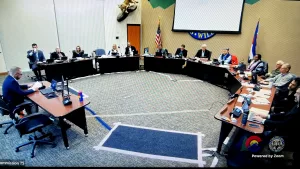
At this week’s CPW Commission meeting, Reid DeWalt confirmed that people want to know where the wolves are. DeWalt is the Assistant Director for the Aquatic, Terrestrial, and Natural Resources branch for Colorado Parks and Wildlife.”
“Much has been asked and requested and right now we are working on products and the kinds of those products where we can share wolf location information to the public. Obviously, there is sensitivity for the protection of those animals but we are getting a product which will be released soon, hopefully in the coming week, where the public will be able to see on our website where those animals are generally located and we will update that on a very frequent basis. We know there are a lot of requests for that. So I just wanted to let folks know that there is some more information coming.”
We asked if there could be an app for tracking the wolves, that could be used by those recreating and by ranchers. Here is Duncan’s response. “This is not something the agency is considering. However, we are committed to transparency so we are working on providing wolf activity information both through our local AWMs/DWMs to support their work with local ranchers and posting pack territory information when they actually form and establish pack territories.”
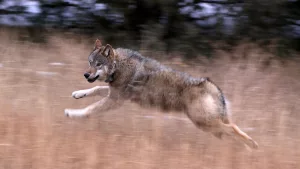
DeWalt also confirmed that the wolves that were released last month are still in Colorado.
“I’m happy to report that all of the animals are still in Colorado. All are doing well. They’re still alive and we haven’t had any reports of depredation. We’re grateful for that, that they’re doing so well.”
We asked if depredation incidents will be reported with a press release. How will people find out? Ranchers in Jackson County have called Steamboat Radio News when there is an incident, which is how we have found out and reported it only to eventually be confirmed by CPW. Here is what Duncan wrote, “It is our intent, similar to other states, to post on our website with regular frequency, wolf pack territories and other information to assist the public in following activity, incidents, etc. In addition, our regional staff will, as they always have, stay in direct communication with ranchers in their communities and we will be there to offer support in all the manners captured in the restoration plan. In our preparations for our upcoming After Action Review (AAR) we have been in contact with legislators and livestock producers to hear what information would be helpful for CPW to provide and their thoughts about frequency of reporting.”
The response did not mention press releases to media. So should a rancher have a depredation incident, please email Shannon@SteamboatRadio.com so that we can also confirm and report it.
We also asked about the definition of chronic depredation and when the 10J Rule will be used. Duncan wrote, “Page 27 of the Colorado Wolf Restoration and Management Plan defines what would be required to make the determination. There is not a specific definition of a “chronically depredating” pack or wolf. CPW program managers along with USFWS will make the determination as to whether a situation is characterized as chronic depredation on a case-by-case basis. A full evaluation of the circumstances will include considerations such as: 1) documented repeated depredation and harassment in a limited geography caused by the wolf or pack targeted; 2) previously implemented practices to reduce depredation; 3) likelihood that additional and continued wolf related mortality would continue if control is or is not implemented; and 4) unintentional or intentional use of attractants that may be luring or baiting wolves to the location.”
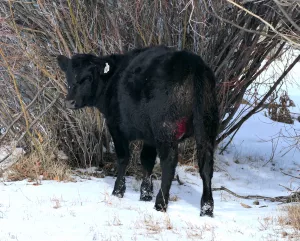
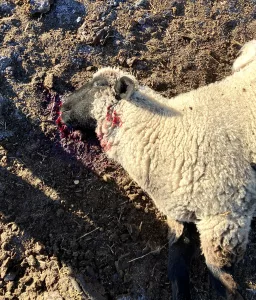
The continued wolf depredation incidents in Jackson County (lambs, cattle, and dogs) have been frequently reported by Steamboat Radio News. Don Gittleson requested the 10J Rule be considered for the remaining wolves in that pack and it was denied by CPW Director Jeff Davis last month.
CPW DENIES GITTLESON’S REQUEST TO IMPLEMENT 10(J) RULE ON JACKSON COUNTY WOLVES
Reid DeWalt told the commission about reports of the Oregon wolves being chronic depredators. He says every wolf has a potential to attack livestock and that they still picked the right wolves.
“We have said from the very beginning that where wolves and livestock share the landscape, there is always that potential for conflict. So in Oregon, we passed on several packs that are currently in the midst of known depredations. Some of those packs would have had simple captures, but recent depredations removed them from any consideration. I think it’s important to know that we did flag those that were in current depredation situations. Much has been made of the Wyoming packs, and they had depredation issues in early 2023. Management removal this summer and since that time there have been no further depredations. We are not trying to hide anything. I want to make it clear as well that Oregon Fish and Wildlife did not give us their problem animals. That was not done. And we wouldn’t do that to them. That’s just the agreement we have. I want to make sure that is clear.”
“Looking back on this, Eric (Odell) and I and others have talked about this at length, with three to four weeks behind us, if we were in a position to revisit that pack selection today I would say that we would select the same animals that we brought down. I think the major thing that we would do differently would be to communicate that more clearly as to why those decisions were made, and we’re working on that into the future.”
THREE OF THE FIVE WOLVES RELEASED IN COLORADO WERE IN PACKS THAT KILLED OR INJURED LIVESTOCK IN OREGON
DeWalt adds that there is always the possibility of depredation.
“I want to emphasize the Technical Working Group Report and the statement that is in there. It says, ‘Because depredation is situational, even wolves that are not known to be depredators have the potential for depredation. Overall, it is difficult to predict depredation behavior.’ I think that is important as we look to the future that we are managing a carnivore. Everyone needs to be aware of that. These are animals that prey on other animals so we need to be clear and open with that.”
DeWalt added, “We knew there would be things that we could not plan for and it would not be perfect. When things go badly, step up to the plate and say you screwed up. I would say we got many things right, but we did get some things wrong. We need to properly notify the impacted communities with the release of wolves. For those things that we did not get exactly right, I apologize. We were all working in our best efforts to get it right. We will continue to listen and learn to get it better. We have an After Action Review. We’re going to learn and we’re going to get better.”
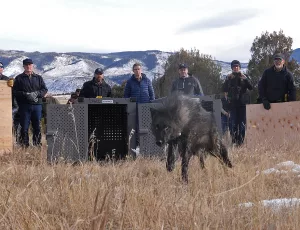
When the first five wolves were released on Dec. 18 in Grand County, information wasn’t released until after it happened. We were told that about 45 people were there, with Governor Polis and First Gentleman Marlon Reis. Many were supporters of the wolf reintroduction initiative. Those who weren’t told and who weren’t there were local ranchers in the area, local and state elected officials, members of the CPW Wolf Commission, and local media. Pool reporters were hired (who did not at first include Steamboat Radio News and questioned if we were a true media outlet).
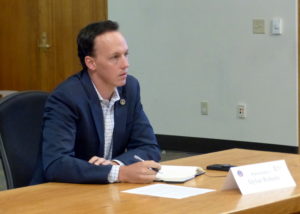
Senator Dylan Roberts represents Senate District 8 which includes Grand County where the wolves were released.
“Most of us in northwest Colorado were very concerned about the reintroduction of wolves but as we got closer to that date we were hopeful that CPW would be a partner and be very open and transparent to help agriculture producers in our area. So the complete lack of transparency and lack of notification around the reintroduction was incredibly disappointing. I am grateful that Director Davis has apologized but we have a long way to go to rebuild trust between our local agriculture producers, communities, and the state government. I’m hoping that we can get there but this has been very difficult.”
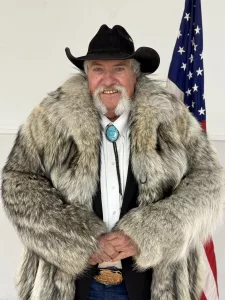
Senator Perry Will of Newcastle represents Senate District 5 and he was also disappointed not to be told the wolves had been released until after the fact.
“I think all Western Slope legislators and all legislators that have skin in the game with this wolf reintroduction, heck, I’m kind of Wolf Reintroduction Central right there in Senate District 5, and ya, it was just a matter of courtesy extending that invitation. At least if you have the invitation, you can decline it, but at least you know about it and if it’s that secret of a thing then say, ‘Hey, let’s keep this under your hat,’ and all of us can. Right? I mean, if it involves safety or something or you think there was safety concerns with employees or something like that, of course, any of us what keep whatever. It was a matter of courtesy, or extending courtesy to our elected officials.”
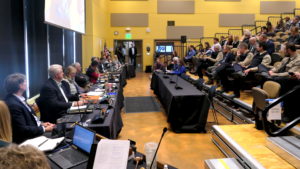
The Colorado Parks and Wildlife Wolf Commission worked on the plan for reintroduction for two years. Marie Haskett represents sportspersons and outfitters on the commission, based in Meeker. She spoke to the commission at this week’s meeting in Denver.
“Wildlife does not understand politics nor should the management of wildlife be politically driven.”
“This commission was asked to fast-track wolves by the Governor. This commission and staff did not do that. This commission spent two years, sometimes with two meetings a month, working diligently to complete and approve a wolf plan. We listened to hours of public testimony. Staff spent years and countless hours working hard to accomplish this release.”
“Dec. 18 was a sad day because this commission was not notified nor invited to the first wolf release, nor were the people who worked countless hours invited to the second or third wolf release. Nor were members of the legislature, local counties where wolves were released were also not notified of the releases. Even the Grand County Commissioner who was on the TWIG group was not invited to the release and yet other specific members of the working group were.”
“The people who politically drove this issue were present. The divide between rural-urban population was blown up with this ballot initiative. Now CPW has taken a huge hit with the public because of these political actions. Where was transparency? Transparency is a huge issue and the foundation of good politics. CPW staff had made great efforts over the years to work with landowners, ranchers and citizens on wildlife management issues, only to have their relationships questioned by not informing citizens or legislators or county commissioners on what was happening with the release.”
“Landowner relationships are on the edge and many have been ruined. The boots on the ground need to be able to communicate and let the public know what is going on with wolf management. CPW needs those relationships or it won’t be long before every private gate is locked and CPW is not welcome.”
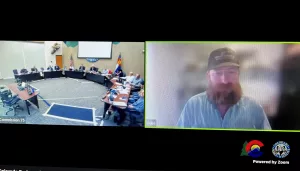
Duke Phillips IV is also on the commission, representing agriculture, out of Colorado Springs. He also expressed his disappointment in finding out the wolves were released, the day after it happened.
“I think a big part of the reintroduction, the majority, is about people. Communication and transparency are paramount to the long-term success of this release and the reintroduction of wolves into Colorado. I, as a commissioner, worked for 16 months on this project. Not to short any of the staff because they put in far more time than we did, but I was out to dinner and on the news the following day I saw it flash across the screen that the wolves have been released, which it hurt to be so invested in something and have such a good feeling about the plan to find out about it the day after it already happened. Me, as a commissioner to feel that way, I can imagine what the producers and the people in the area were feeling.”
“It’s been an emotional thing, but I think we really need to focus on perception. This wolf reintroduction kind of set a stage to pit urban against rural. If you look at the vote, it was very close, and it came down to the wire and going through the plan, I felt like we were on a really good path to get the rural community buy-in and support because that is where most of the impacts are going to be. But with how this release was handled, I just see it as a big wedge, that just got driven further. And our field staff and agency is going to have to be playing catch up now trying to reconvince people. But it is a lot of perception and I think we need to be hyper-sensitive in the way the release was handled. It was tough.”
“Can anyone comment on that now? It is definitely worth flushing out. It is a big deal to me and it’s not a happy thing so I’d like to hear a little bit more about why it was handled or some explanation from someone. Thank you.”
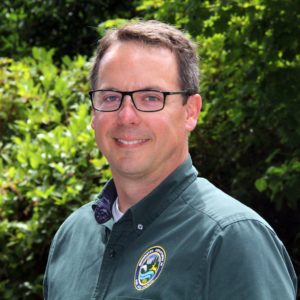
After the comments, Colorado Parks and Wildlife Director Jeff Davis spoke, and apologized for the way the release of the first wolves were handled. He has also reached out to state legislators to speak with them more.
“I want to be really crystal clear and offer my sincerest apologies to you all. I’ve already apologized to General Assembly members and other folks, but I want to be really crystal clear that our staff did their jobs in the usual excellence that CPW does and my apology comes from me because the area that has the most impact was the ball that I dropped. And so I apologize to all of you for the notification and the transparency pieces. Some of that, I’ll just be real clear, like any learning organization, we are in the process of doing an internal after-action review.”
“If you follow those types of things, that is to identify the things that went really well, they went like we thought how they were going to go. Some of the things we did pretty well, but they didn’t come out like we thought they would in identifying strategies and actions for the next go around. We are in that process right now. And again, my apologies for me being the weak link on this operation for CPW and I recognized it when it was going on, what the impact was going to be, but it was doubled, tripled and quadrupled down on as the days kind of played out.”
“I can’t make it clear enough that our staffs did their jobs and they did it really darn well. The less spectacular things are mine.”
“I also want to say, in my experience, and I don’t know all of why this is, but this particular species just elicits a lot of emotion and as public servants, I say maybe perhaps it’s the most honorable job anyone can take on because we serve 5.8 million people and visitors to Colorado.”
“Yeah, folks can say it was a close vote or whatever but those votes other than saying it’s a law are something that CPW as a government agency, our job is to manage within the trust of the public and that means serving everyone. That means we’re trying to look across the spectrum of values and the needs and expectations of everyone in figuring out and using what we know to deliver the greatest benefits to the greatest number of beneficiaries.”
“It’s really important for me that the public knows that we’re here for the whole darn public and that means the pro-wolf people, and that means the ranchers, and that means everybody in between.”
“As long as I am here, and that’s hopefully a long time, We want to be that bridge. We are that bridge. I want to say to the rural communities, ‘We are gonna be there. We are there. We have been there with you all along.’ The people haven’t changed. These are the same people that are part of your community that have those trusting relationships and we don’t want a particular species or any of our actions to result in severing those relationships that are so critically important and that all of us have worked so hard to develop.”
“Wolves are hard. Standing together to make sure we can do this right and do this really well and show the rest of the world that we can do this really well, it’s going to take many partnerships. It’s going to take many hands to make light work going forward.”
Senator Perry Will says he appreciates that apology because it’s a tough thing to do.
“I do want to say that I appreciate the director owning it and saying, ‘We screwed up and we’ll move on from here and do better.’ I think that’s what you want from anyone. Right? Own it, but we can move on from here and do better.”
Director Davis also added that he will continue to work with the Department of Agriculture to get resources to rural communities “who are living with these animals.”
He then said he looks forward to watching the impact on the ecosystem that the wolves will have.
“I don’t want to detract from the value of wolves being back on the landscape. I’m hoping that a lot of people see that putting pieces of ecosystems back together is perhaps the best thing that we can do. Things are changing and the more we can put pieces back together and let them do what they do which is evolve and co-exist, I think that’s going to be important for all of us going forward.”
Director Davis concluded with concern for the Colorado Parks and Wildlife staff and the pressure they have been under.
“We’re learning. We’re feeling it. I don’t know about our staff. Our staff is really good and they’re dedicated. And I worry about that in light of wolves and the pressure that gets put on individual staff and making sure that the agency is behind them and we have their back and that they have the support they need to stay healthy in this because this is just the first step. And restoring trust, transparency and the strength of those relationships is going to be critical and our folks have to have full batteries. They can’t walk into the next step with a depleted energy going forward. So we’re into ways that we as an agency can support our staff to make sure that they’re feeling like they’ve got the tools, resources, and support that they need. That can be tough if you’re in one of these communities. All of a sudden this is there and people are angry and you’re the face. So I really appreciate the services of our officers and biologists that are out there on the front line. And we’re here for you.”
“Hopefully I can make this a lot more positive. There are positives. We are putting pieces back together. I recognize that maybe we took some steps in a different direction on the relationship and the transparency piece and we’re gonna learn from that and we’re gonna restore that and exceed it going forward.”
Dallas May is the chair of the CPW Commission. He represents agriculture out of Lamar. “I think our agency did the best job possible under very difficult circumstances. We are trying to work with everyone we can in a very difficult situation. I’m proud of the way this was handled even though there might be changes in the future. We will learn from that.”
In our list of questions to CPW, we asked about a directive from Governor Polis that no wolves are to be killed using the 10J Rule and the answer was, “There is no directive.”
More Information on the Colorado Parks and Wildlife Commission Meeting
On YouTube
- Colorado Parks and Wildlife Commission Meeting = Day 1
- Colorado Parks and Wildlife Commission Meeting – Day 2
Steamboat Radio News Past Coverage of wolves in Colorado
- Dec. 22, 2023 — FIVE MORE WOLVES ARE RELEASED BY COLORADO PARKS AND WILDLIFE
- Dec. 22, 2023 — CPW DENIES GITTLESON’S REQUEST TO IMPLEMENT 10(J) RULE ON JACKSON COUNTY WOLVES
- Dec. 21, 2023 — THREE OF THE FIVE WOLVES RELEASED IN COLORADO WERE IN PACKS THAT KILLED OR INJURED LIVESTOCK IN OREGON
- Dec. 19, 2023 — LIVESTOCK PRODUCERS RECEIVE WOLF UPDATE FROM CPW IN CRAIG MONDAY
- Dec. 13, 2023 — GITTLESON SAYS ANOTHER CALF WAS ATTACKED BY A WOLF TODAY
- Dec. 11, 2023 — COMPLAINT FILED IN U.S. DISTRICT COURT TO STOP WOLF REINTRODUCTION IN COLORADO
- Dec. 4, 2023 — KEEP YOUR PETS CLOSE AND CARRY A BIG STICK – CPW HAS ADVICE FOR LIVING WITH WOLVES
- Nov. 19, 2023 — THREE LAMBS KILLED BY A WOLF IN JACKSON COUNTY, SAYS RANCHER
- Nov. 17, 2023 – CPW AND CDA ANNOUNCE AGREEMENT TO WORK TOGETHER ON WOLF REINTRODUCTION
- Nov. 7, 2023 – U.S. FISH AND WILDLIFE SETS DATE FOR 10J RULE FOR WOLVES
- Oct. 6, 2023 – COLORADO WILL RECEIVE WOLVES FROM OREGON
- May 16, 2023 – POLIS VETOES 10J RULE WOLF BILL
- May 3, 2023 – CPW COMMISSION APPROVES FINAL WOLF RESTORATION AND MANAGEMENT PLAN
- May 2, 2023 – MANAGEMENT OF GRAY WOLVES REINTRODUCTION BILL PASSES IN STATE HOUSE
- May 2, 2023 –CPW MEETS THIS WEEK FOR FINAL WOLF MANAGEMENT PLAN
- April 27, 2023 – CPW CONFIRMS WOLF SIGHTING EAST OF KREMMLING
- April 8, 2023 – CPW WOLF COMMISSION MEETS IN STEAMBOAT SPRINGS
- April 3, 2023 – CPW TO PRESENT FINAL DRAFT WOLF RESTORATION AND MANAGEMENT PLAN IN STEAMBOAT SPRINGS
- March 28, 2023 – THE SOUTHERN UTE TRIBE ASKS THAT CPW RELEASES WOLVES ALONG I-70 CORRIDOR
- March 15, 2023 – TWO DOGS DIE FROM WOLVES IN JACKSON COUNTY THIS WEEK
- March 3, 2023 –COLORADO PARKS AND WILDLIFE COMMISSION RELEASES WOLF REINTRODUCTION MEETING RECAP
- Feb. 10, 2022 – MONTANA STOCKGROWERS VOICE SUPPORT FOR COLORADO RANCHERS OVER THE WOLVES
- Feb. 9, 2022 – WOLF MANAGEMENT DISCUSSED BY LOCAL RANCHERS AND OFFICIALS AT FORUM IN STEAMBOAT
- Jan. 22, 2022 – WOLF MITIGATION OPTIONS
- Jan. 19, 2022 – ANOTHER COW KILLED OVERNIGHT IN NORTH PARK BY WOLVES
- Jan. 18, 2022 – TWO MORE COWS ATTACKED BY WOLVES IN JACKSON COUNTY TUESDAY
- Jan. 12, 2022 – CPW ALLOWS WOLVES TO BE HAZED IN EMERGENCY DECLARATION
- Jan. 10, 2022 – A WOLF PACK KILL IS REPORTED IN JACKSON COUNTY OVER THE WEEKEND
- June 9, 2021 – WOLF DEN WITH PUPS CONFIRMED IN NW COLORADO